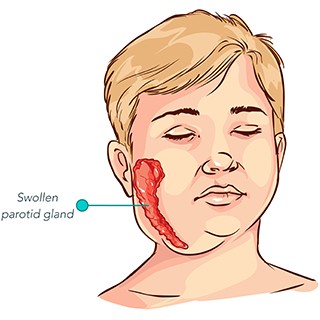Mumps
Mumps is a contagious disease caused by a virus. It typically starts with a few days of fever, headache, muscle aches, tiredness, and loss of appetite, followed by swollen salivary glands.
Although mumps is no longer very common in the United States, outbreaks continue to occur. Outbreaks have most commonly occurred in places where people have had prolonged, close contact with a person who has mumps, such as attending the same class, playing on the same sports team or living in the same dormitory.
Fact Sheet - Mumps (English version)
Fact Sheet - Mumps (Spanish version)
How mumps is spread
Mumps spread through saliva or mucus from the mouth, nose or throat. An infected person can spread the virus by:
- coughing, sneezing or talking,
- sharing items, such as cups or eating utensils, with others, and
- touching objects or surfaces with unwashed hands that are then touched by others.
Mumps likely spread before the salivary glands begin to swell and up to five days after the swelling begins.
What are the symptoms of mumps?
Swollen jaw and puffy cheeks are the main signs of mumps. The most common symptoms include:
- fever
- headache
- muscle aches
- tiredness
- loss of appetite
- swollen and tender salivary glands under the ears on one or both sides (parotitis)
Symptoms typically appear 16 - 18 days after infection, but this period can range from 12 - 25 days after infection. Some people who get mumps have very mild or no symptoms, and often they do not know they have the disease. Most people with mumps recover completely in a few weeks.

How serious is the disease?
Mumps can be serious, but most people with mumps recover completely in a few weeks. While infected with mumps, many people feel tired and achy, have a fever and swollen salivary glands on the side of the face. Others may feel extremely ill and be unable to eat because of jaw pain, and a few will develop serious complications. Men and adolescent boys can develop pain or swelling in their testicles, which rarely results in sterility.
Inflammation of the protective membranes covering the brain and spinal cord (meningitis) and loss of hearing can also occur, and in rare cases, this hearing loss can be permanent. The most serious complication is inflammation of the brain (encephalitis), which can lead to death or permanent disability.
How do I keep from getting mumps?
Besides avoiding people with mumps, the Measles/Mumps/Rubella (MMR) or the Measles/Mumps/Rubella/Varicella (MMRV) vaccines are the best protection against mumps. According to the CDC, the MMR vaccine is very safe and effective. The mumps component of the MMR vaccine is about 88 percent (range: 66-95 percent) effective when a person gets two doses; one dose is about 78 percent (range: 49−92 percent) effective.
Practicing good hygiene, including proper handwashing, is also very important in protecting yourself from mumps and many other diseases.

Additional links:


 TARRANT COUNTY, TX
TARRANT COUNTY, TX

 Epidemiology
Epidemiology